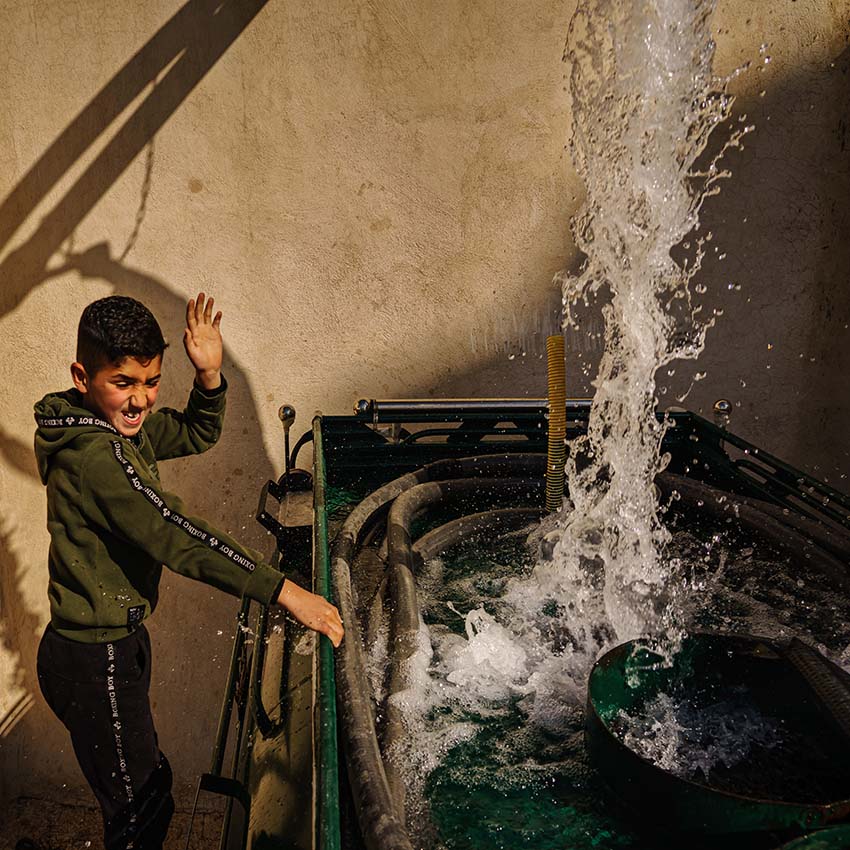Using AI to control energy for indoor agriculture
30 September 2024
Published online 4 October 2023
The increasing groundwater trade and tanker sales aggravate the country’s resource crisis.

According to UN guidelines, each household has a right to access 50 to 100 litres of water, at a reasonable price, for personal and domestic use. In Jordan the annual per capita share is less than 40 litres.
The study found that the illegal market provides 15% of the kingdom’s total drinking water, at an inflated cost, and accounts for 52% of water revenues in urban areas, limiting the public supply system’s ability to recover costs. The trade also depletes 27% of the water in groundwater reservoirs.
The research team revealed that some private sector companies, licensed by Jordan’s government to provide this service, illegally overdraw groundwater, jeopardizing water security in the kingdom.
“The study aims to ascertain how tanker water sold in urban areas in Jordan affects the groundwater supply of the water-scarce country. In total, we found that such tanker water sales amount to 10.7 times their amount in official records, hinting to wide scale illegal unregulated extractions of groundwater,” said Christian Klassert, a post-doctoral researcher in Helmholtz Center for Environmental research, and co-author of the study.
Klassert also told Nature Middle East that public water systems in Jordan supply water for an average of 36 hours a week, causing 92% of Jordanian households to resort to buying tanker water.
Klassert says the high price of tanker water is largely blamed on the high cost of transporting it via road, as opposed to efficiently transporting it through public pipeline networks. According to the study, the tanker water market accrues costs that are 4.8 times higher than the costs accrued by pipeline networks.
Scarce information
The informal unregulated nature of the tanker water market explains the lack of information about it. The research team reconciled different models for groundwater demand in urban areas, accounting for shortages in public pipeline water supplies, the willingness of well owners to sell water, and the costs of land transport of water, to come up with an economically viable model for selling tanker water.
The model was developed by a research team in Helmholz Center for Environmental Research in collaboration with researchers from Stanford University and Jordan University for Science and Technology, with the support of Jordan’s Ministry of Water and Irrigation. The team verified its estimates using several data sources, including the number of licensed active water tankers and the amount of wastewater flow.
“We used the model to predict how the changing demand and the quantities of groundwater will affect the development of tanker water markets in different scenarios”.
Unlike the case with surface water, groundwater depletion can be subtle. Therefore, such water is more prone to be exploited. Depleting it from underground layers in a rate that exceeds its natural replenishment can lead to drought and the collapse of surface land.
Klassert pointed out that groundwater levels are falling rapidly in areas where the number of unlicensed wells is on the rise, around urban regions like the capital Amman, and in the city of Zarqa. Some regions even saw a drop of 3.5m meters annually in groundwater levels. “Currently, wells have to be dug to 220 meters deep to extract water from them”, says Klassert.
An overwhelming crisis
Osama Sallam, Groundwater Projects Manager in Abu Dhabi’s Environment Agency notes that overdrawing water from Jordan’s groundwater reservoirs threatens, among other problems, to increase the level of saline groundwater and contaminate fresh water, making it unsafe for drinking and irrigation
Sallam told Nature Middle East, this also kills animals and plants reliant on groundwater, and causes the displacement of populations in water-scarce regions.
Although Jordan shut down many unlicensed water wells in 2013, the majority remain in operation due the challenges of detecting them.
“The best way is to improve public water supplies”, says Klassert who asserts that any policy must protect vulnerable populations’ basic right to access to water.
The study put forth several solutions to the crisis including repairing damaged water pipelines and expanding desalination projects. Sallam recommended rationalizing water consumption, using of smart irrigation systems, and treating wastewater.
doi:10.1038/nmiddleeast.2023.186
Stay connected: